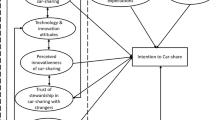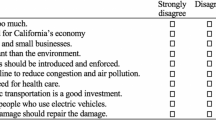Abstract
Despite recent investments in and growing availability of various public transport information services, levels of apparent non-use (of particular information services) across the population remain high. Policymakers and information service providers could benefit from a better understanding of factors affecting information use. The goal of this paper is to provide more insight into the (non-)use of public transport information by applying attitude theory. A postal survey was sent to a random sample of 10,000 households in Bristol and Manchester, UK. The response rate was 13%. Respondents were questioned about an uncertain journey they were going to make. Structural equation modelling has been used to investigate interdependencies among the factors studied. The results show that the desire to consult public transport information for an uncertain journey is affected by attitudes, subjective norms, and past behaviour. These social-psychological factors are in turn affected by constraints such as travel behaviour and trip context. Crucially in terms of addressing issues of non-use of information it is found that consulting information is influenced by propensity to consider using public transport rather than vice versa as has hitherto been implicitly assumed by many involved in the provision of transport and information services.


Similar content being viewed by others
Notes
The EMGB uses the wider concept of ‘volition’ (encompassing among other things the effort needed to enact a certain behaviour) instead of ‘intention’ (Perugini and Conner 2000). Also, behavioural desire (motivation to act) is expected to precede volition. However, discriminant validity tests showed no distinction between behavioural desire and volition in our data. Therefore, we do not distinguish between the two constructs and use the term ‘intention’ instead.
Concerning work trips; the role of employers in stimulating public transport use is discussed further down in the results section and the conclusions.
The Root Mean Square Error of Approximation (RMSEA) is based on chi-square values and measures the discrepancy between observed and predicted values per degree of freedom. A good model has an RMSEA value of less than 0.05.
The direction of causality seems to be more likely as described above than the other way round: because one thinks that consulting PT information in planning this journey would be useful, one might consider travelling by public transport.
References
AEA Technology: Transport direct evaluation: final report. UK Department for Transport. http://www.dft.gov.uk/162259/245385/249577/TD_Final_Report_Version_1.21.pdf (2007). Accessed 23 Apr 2009
Ajzen, I.: The theory of planned behavior. Organ. Behav. Hum. Decis. Process. 50, 179–211 (1991)
Allison, P.D.: Missing data techniques for structural equation modeling. J. Abnorm. Psychol. 112, 545–557 (2003)
Beirão, G., Cabral, J.A.S.: Understanding attitudes towards public transport and private car: a qualitative study. Transp. Policy 14, 478–489 (2007)
Bristol City Council: Statistics and census information. http://www.bristol.gov.uk/ccm/navigation/council-and-democracy/statistics-and-census-information/;jsessionid=9FF6B1FCA642815482F9CF76EAAB7A15 (2008). Accessed 23 Apr 2009
Cain, A.: Are printed transit information materials a significant barrier to transit use? J. Public Transp. 10, 33–52 (2007)
Chorus, C.G., Molin, E.J.E., Van Wee, B.: Use and effects of advanced traveller information services (ATIS): a review of the literature. Transp. Rev. 26, 127–149 (2006a)
Chorus, C.G., Molin, E.J.E., Van Wee, B., Arentze, T.A., Timmermans, H.J.P.: Responses to transit information among car-drivers: regret-based models and simulations. Transp. Plan. Technol. 29, 249–271 (2006b)
Chorus, C.G., Arentze, T.A., Timmermans, H.J.P., Molin, E.J.E., Van Wee, B.: Travelers’ need for information in traffic and transit: results from a web survey. J. Intell. Transp. Syst. 11, 57–67 (2007)
De Witte, A., Macharis, C., Mairesse, O.: How persuasive is ‘free’ public transport? A survey among commuters in the Brussels capital region. Transp. Policy 15, 216–224 (2008)
DETR: A new deal for transport-better for everyone. Transport white paper. Department for the Environment, Transport and the Regions, London, July (1998)
DETR: Transport 2010—the ten year plan. Department of the Environment, Transport and the Regions, London, July (2000)
Dijst, M., Farag, S., Schwanen, T.: A comparative study of attitude theory and other theoretical models for understanding travel behaviour. Environ. Plan. A 40, 831–847 (2008)
Farag, S., Lyons, G.: What affects pre-trip public transport information use? Empirical results of a qualitative study. Transp. Res. Rec. 2096, 85–92 (2008)
Farag, S., Lyons, G.: Public transport information (non-)use empirically investigated for various trip types. Paper presented at the annual meeting of the transportation research board, Washington DC US, January 2009. Submitted for publication, available from the authors upon request (2009)
Fuji, S., Kitamura, K.: What does a one-month free bus ticket do to habitual drivers? Transportation 30, 81–95 (2003)
GfK NOP: Travel information services wave 10–8th to 13th March 2007. UK Department for Transport. http://www.dft.gov.uk/173086/249736/249739/wave10 (2007). Accessed 23 Apr 2009
Goulias, K.G., Kim, T., Pribyl, O.: A longitudinal analysis of awareness and use for advanced traveler information systems. J. Intell. Transp. Syst.: Technol. Plan. Operat. 8, 3–17 (2003)
Grotenhuis, J., Wiegmans, B.W., Rietveld, P.: The desired quality of integrated multimodal travel information in public transport: customer needs for time and effort savings. Transp. Policy 14, 27–38 (2007)
Ipsos MORI: Contribution made by traveline Scotland to modal shift. Scottish Executive Social Research. http://www.scotland.gov.uk/Resource/Doc/139659/0034503.pdf (2006). Accessed 23 Apr 2009
Jöreskog, K.G., Sörbom, D.: LISREL 8: user’s reference guide. Scientific Software International, Lincolnwood (2001)
Jöreskog, K.G.: Structural equation modeling with ordinal variables using LISREL. http://www.ssicentral.com/lisrel/techdocs/ordinal.pdf (2005). Accessed 23 Apr 2009
Krizek, K., El-Geneidy, A.: Segmenting preferences and habits of transit users and non- users. J. Public Transp. 10, 71–94 (2007)
Manchester City Council: Statistics and census information. http://www.manchester.gov.uk/site/scripts/documents.php?categoryID=200088 (2008). Accessed 23 Apr 2009
Molin, E.J.E., Timmermans, H.J.P.: Traveler expectations and willingness to pay for Web-enabled public transport information services. Transp. Res. C: Emerg. Technol. 14, 57–67 (2006)
Olinsky, A., Chen, S., Harlow, L.: The comparative efficacy of imputation methods for missing data in structural equation modeling. Eur. J. Oper. Res. 151, 53–79 (2003)
Perugini, M., Conner, M.: Predicting and understanding behavioral volitions: the interplay between goals and behaviors. Eur. J. Soc. Psychol. 30, 705–731 (2000)
Peirce, S., Lappin, J.: Why don’t more people use advanced traveler information? Evidence from the Seattle area. Paper presented at the 83rd annual meeting of the transportation research board, Washington, DC, USA, January (2004)
Taniguchi, A., Fuji, S.: Promoting public transport using marketing techniques in mobility management and verifying their quantitative effects. Transportation 34, 37–49 (2007)
Transportation Research Board: TCRP report 95 chapter 11 transit information and promotion—traveler response to transportation system changes. http://onlinepubs.trb.org/Onlinepubs/tcrp/tcrp_rpt_95c11.pdf (2003). Accessed 6 Sep 2009
Thøgersen, J.: Understanding repetitive travel mode choices in a stable context: a panel study approach. Transp. Res. A 40, 621–638 (2006)
Van Exel, N.J.A., Rietveld, P.: Could you also have made this trip by another mode? An investigation of perceived travel possibilities of car and train travellers on the main travel corridors to the city of Amsterdam, The Netherlands. Transp. Res. A 43, 374–385 (2009)
Van der Horst, R.: Getting there & away. The role of travel information in recreational day trips, with a specific focus on the mode and destination choice. Dissertation, Utrecht University, Utrecht, The Netherlands. http://igitur-archive.library.uu.nl/dissertations/2006-1121-201558/index.htm (2006). Accessed 23 Apr 2009
Verplanken, B., Aarts, H., Van Knippenberg, A.: Habit, information acquisition, and the process of making travel mode choices. Eur. J. Soc. Psychol. 27, 539–560 (1997)
Acknowledgements
This paper is based upon a 3-year study which forms part of the FUTURES programme in the UK (Future Urban Technologies: Undertaking Research to Enhance Sustainability) that is funded by the EPSRC (Engineering and Physical Sciences Research Council). The authors wish to thank Professor Marco Perugini (Faculty of Psychology, University of Milan-Bicocca) and Professor Mark Conner (Institute of Psychological Sciences, University of Leeds) for their useful remarks concerning the questionnaire. Dr Anne Boomsma (Department of Sociology, University of Groningen) is thankfully acknowledged for his helpful comments regarding the data analysis.
Author information
Authors and Affiliations
Corresponding author
Rights and permissions
About this article
Cite this article
Farag, S., Lyons, G. Explaining public transport information use when a car is available: attitude theory empirically investigated. Transportation 37, 897–913 (2010). https://doi.org/10.1007/s11116-010-9265-1
Published:
Issue Date:
DOI: https://doi.org/10.1007/s11116-010-9265-1




